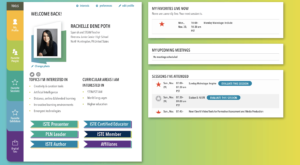10 Things a Good Biz Article on K12 Would Include
Pass the hatchet from the New York Times to Business Week. Last week John Hechinger posted a lame wandering attack on learning online, K12 in particular, and oddly one early investor in the public company, Michael Milken. It was sloppy, inaccurate, and embarrassing for Bloomberg and Business Week.
Hechinger solicits a couple predictable slams from cranks. One points to a use case (kids left at home alone with a computer) that no one proposes or advocates. In contrast, my interview with 3 K12 teacher paints the true picture of elementary partnerships with parents.
He opens the door to cost critics but provides no analysis. He quotes a superintendent that claims he could run a school for a third of what K12 does—and that’s just absurd. If he cared about quality, his staffing patterns would be similar to K12 (and his traditional schools) and his support costs even higher on a per student basis.
For a business writer, Heckinger seems reviled by activities that look like marketing. He ignores problems associated with the ineffective monopoly public delivery system and the barriers to private enterprise. He misses the fact that 4 million kids are learning online at home and at school because it’s the best option available.
We interviewed Rose Fernanedez a few months ago. She runs a national parent organization that advocates for more online learning. Rose understands well the frustration of parents that feel trapped and are desperate for educational options—too bad Heckinger missed all of that.
A real Business Week feature would have covered:
1) The failure of elementary and secondary education to serve low income families and serve student that learn differently.
2) The need for quality at scale and the inability for districts and nonprofits to achieve scale.
3) The need for innovation in education and the unique ability of the private sector to produce and scale innovation, and the unusual barriers that block private sector involvement in American education.
4) The fact that while a few of us ran small online schools in 1999, Rod Packard had a dream of a school that could serve hundreds of thousands of students around the world.
5) The fact that despite a limited track record outside of publishing, Ron Packard successfully capitalized his company and became the first major 21st century education public offering.
6) The growth of sector, led by for-profit like K12 and Connections Academy and nonprofits like Florida Virtual School, that now serves twice as many students as charter schools.
7) The ongoing role that K12 plays to support quality options for parents nationwide (to the benefit of everyone else that supports school choice).
8 ) The aggregate benefit of K12 helping to drag education into 20th century (we’re still running about a decade behind) and piloting 21st century blended school models.
9) The accelerating learning innovation space and the role that K12 and the publishers play as the primary exit vehicle for innovations with traction.
10) The role that online and blended learning will play in reaching the next billion young people worldwide—a force likely to connect more families to prosperity than the green revolution—and the role that K12 will play.
It’s unfortunate that Business Week ran an odd story rehashing Milken rather than the seminal piece on the vital role that K12 is playing in American education.
K12 is creating opportunities for students, families, nonprofits, and school districts across America. They have played a vital role in expanding opportunities for families and advancing the role of the private sector. I’m proud to count them as an advocacy partner. They deserve better from a leading business publication.







0 Comments
Leave a Comment
Your email address will not be published. All fields are required.